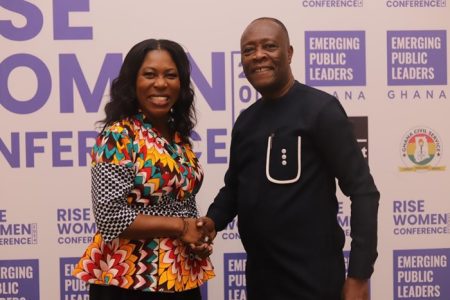Professor George KT Oduro, a prominent academic from the University of Cape Coast, has emphasized the crucial role of empowering women in achieving economic transformation and gender equality.
The rise women conference
In his presentation at the Rise Women Conference in Accra, on the topic “Empowering Women for Economic Transformation: A Path to Gender Equality and Inclusion,” Prof. Oduro underscored the interconnectedness of these goals and emphasized the need for strategic interventions to overcome entrenched social and cultural barriers.
Significance of SDG 5 and inclusivity
He highlighted the significance of Sustainable Development Goal (SDG) 5, which seeks to achieve gender equality and promote inclusivity, and noted that achieving these objectives requires creating environments where diversity is celebrated and where all individuals, regardless of their backgrounds, feel valued and supported.
“We need to create the room for inclusivity. It calls for a workplace where individual differences in the workforce are recognized, and where everyone is made to feel welcome and accepted, irrespective of tribe, color, religion, political orientation, or any other form of diversity,” he stated.
Equality vs. equity
Prof. Oduro explained that while equality in opportunities is essential, it is equally important to address issues of equity.
He referenced the government’s flagship Free Senior High School initiative, which provides equal access to education for all students, regardless of their economic background.
However, he cautioned that equality without equity could perpetuate existing inequalities.
“Equality minus equity only perpetuates unique challenges and underlying causes of inequality,” he said.
He further noted, “Providing the same opportunities to everyone is necessary, but it is equally important to ensure that individuals who face unique challenges receive the support they need to fully take advantage of these opportunities.”
Empowering women for economic growth
He emphasized that empowering women is not only a matter of fairness but also a critical component of driving economic growth, reducing poverty, and improving living standards.
“Inclusivity has something to do with equity. It involves creating an environment where all individuals feel valued, respected, and supported. Empowering women means enabling them to participate actively in leadership roles, which is essential for economic growth and transformation.”
Women’s unique strengths in economic development
Prof. Oduro praised the unique strengths that women bring to the table, stressing that women possess innate abilities that can significantly contribute to economic development.
He highlighted women’s ability to multitask and manage various responsibilities, both in the household and in professional settings.
These strengths, he argued, should be harnessed to support broader economic transformation efforts.
“Women have the capacity for undertaking multiple tasks,” he observed.
“They are often better at switching between different tasks or mental sets, and this ability can be a tremendous asset in planning and executing economic strategies.”
Challenges in gender representation in education
Prof. Oduro also examined the current state of gender representation in education, citing data that shows progress at the basic and junior high school levels, where female students make up nearly half of the student population.
However, he pointed out that gender representation decreases at higher levels of education, with women comprising only 38% of students at the tertiary level.
This disparity, he argued, reflects the ongoing challenges that women face in accessing quality education and advancing in their careers.
“In spite of the inroads made, more needs to be done to include women,” Prof. Oduro asserted.
He pointed to social and cultural barriers that continue to hinder the full realization of gender equality, particularly for women in rural and less endowed areas.
Call for strategic interventions
To address these challenges, Prof. Oduro called for strategic interventions, including the implementation of functional gender policies in public organizations and the creation of gender-sensitive leadership structures.
He argued that such measures are essential to ensuring that the needs and perspectives of women are adequately represented in decision-making processes.
“Every public organization must possess a functional gender policy,” he emphasized. “Creating gender-sensitive leadership is crucial to achieving true gender equality and driving economic transformation.”
Country Director of Emerging Public Leaders
Country Director of Emerging Public Leaders Ms. Juliet A. Amoah, said the Rise Women Conference focuses on giving young people a chance to contribute to a more vibrant, responsive public sector.
She pointed out that despite several measures, significantly more men than women are applying for and ultimately getting into the yearlong program.
According to her, engagement with employers revealed that women are likely to receive less remuneration for completing the exact same tasks as their male counterparts.
Despite significant strides made in the last decade, women continue to face multifaceted barriers to equality, ranging from economic exclusion to gender-based violence and limited access to decision-making spaces.
In fact, 10.3% more women than men live in extreme poverty worldwide.
Discussions at the two-day conference center on three critical areas namely identifying key actions and investments to uplift women from poverty, uncovering and emphasizing gender-responsive policies to address systemic inequalities, and fostering collaborations to mobilize resources effectively.
These objectives are not mere aspirations but concrete steps toward tangible outcomes that will enhance the lives and opportunities of women and girls in Ghana.
The Rise Women Conference, held under the theme “Empowering Women Leaders: Paving the Way to Equality,” brought together influential women leaders, policymakers, and advocates from across the country.
It served as a platform for discussing and advancing the cause of women’s empowerment in Ghana.
- Prof Opoku-Agyemang seeks medical treatment abroad - 30 March 2025
- 3 missing in suspected pirate attack on fishing vessel - 29 March 2025
- MPs to blow GH₵41.2m monitoring GH₵55m projects - 29 March 2025

